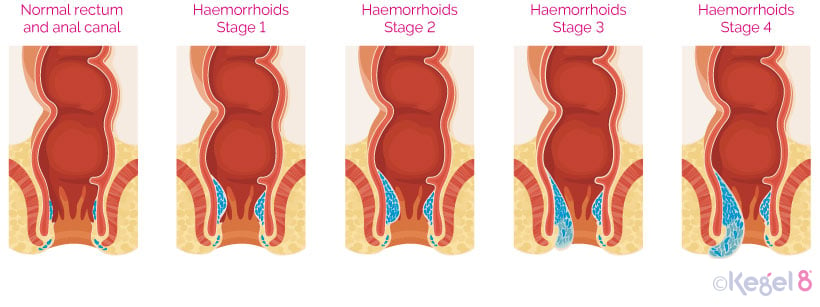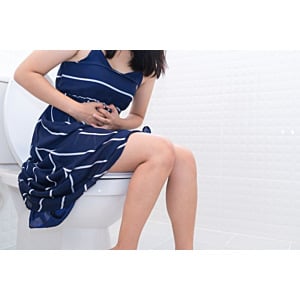The StressNoMore Guide to Haemorrhoids
Haemorrhoids (also known as piles) are a common condition that affects men and women of all ages. Although you might find it embarrassing, it might make you feel better to know that by the age of 50, over 50% of people have suffered with piles at some time in their life - in fact, it was reported this week that 'haemorrhoids' was Google's hottest health search term of 2012!
Here at StressNoMore we understand that haemorrhoids can be embarrassing, uncomfortable and damage your self-esteem. Learn about the condition here and what can be done to help.
The StressNoMore Guide to Haemorrhoids/Piles
What are Piles?
Haemorrhoids, or Piles occur when the veins in and around your anus and rectum become swollen and inflamed. There are 4 different grades of piles, 1st degree being the least severe and 4th degree being the most severe:
First-degree Haemorrhoids - these are small swellings that cannot be seen from the outside. A lot of people don't even know that they have first-degree piles. They can go away by themselves or can progress to second-degree piles.
Second-degree Haemorrhoids - these are larger. They may appear when you go to the toilet but then disappear inside again.
Third-degree Haemorrhoids - these can be seen from the outside of the anus. They hang down but can be pushed back inside.
Fourth-degree Haemorrhoids - these are the most severe type of piles. They permanently hang down and cannot be pushed back inside. They can become large and painful.

Depending on how severe the piles are, treatment is different. 1st and 2nd degree piles usually go away by themselves with some simple lifestyle changes and over-the-counter treatments, but 3rd and 4th degree piles, if painful, might require treatment by a doctor.
What causes Piles?
We don't know exactly what causes piles, however it's thought that constipation contributes in a big way to piles and pregnant women are also more likely to suffer.
Other things which may increase your chances of getting haemorrhoids include:
- Being overweight
- Prolonged constipation
- Pregnancy
- Being over 50 - as you get older, your tissues get weaker, which increases your risk of getting piles
- Frequent heavy lifting
- Prolonged diarrhoea
- Family history of haemorrhoids
Treatment for Piles/Haemorrhoids
To treat mild 1st and 2nd degree haemorrhoids, you can usually manage the condition yourself with a few lifestyle changes and over-the-counter remedies:
- Eat plenty of fibre: this prevents constipation which can aggravate haemorrhoids and lead to the development of new ones. You can do this by adding more fruits, vegetables, wholegrain breads and cereals to your diet.
- Avoid constipation: constipation can worsen piles and actually lead to the development of piles.
- Use moist toilet paper: using moist toilet paper instead of dry toilet paper is kinder to your skin if you suffer from piles.
- Over-the-counter creams and ointments: if your haemorrhoids are painful and/or itchy, over-the-counter creams from a pharmacy can really help your symptoms. They will not get rid of piles, but they will help you to manage the symptoms. They should only be used for around 5-7 days at a time; if your symptoms persist after this time then you should see your doctor.
Other treatments for haemorrhoids include:
- Corticosteroid Creams: if the inflammation is particularly bad, you can use a corticosteroid cream that your GP can prescribe. This can thin the skin so should only be used for a short period of time.
- Painkillers: simple over-the-counter painkillers such as paracetamol can be taken if your haemorrhoids are particularly painful. Your doctor can also prescribe a local anaesthetic cream that can be applied directly to the area. Again, these should only be taken for a short period of time.
- Laxatives: constipation is very detrimental to your health, even more so if you are suffering from haemorrhoids. Laxatives are available to help you to go to the toilet. There are natural alternatives such as Senna, or your GP can prescribe something.
Haemorrhoids often respond well to conservative treatments and lifestyle changes. However, if they are particularly severe and are causing marked pain and discomfort, there are more radical treatment options that may be used.
- Banding: this involves a tight elastic band being placed around the base of the haemorrhoid to cut off the blood supply. Within approximately a week, the haemorrhoid shrivels up and falls away. This is often used for 3rd degree haemorrhoids that have resisted other treatment. It may cause a degree of pain but painkillers can be given and most people are back at work the following day.
- Injections/Sclerotherapy: this involves injecting a liquid directly into the haemorrhoid. This works in two ways: short-term it acts on the nerve endings to relieve the pain and over a period of four-to-six weeks, the haemorrhoid should shrink or shrivel up. There may be some minor bleeding after the treatment however you should be able to back to work the next day.
- Surgery: if haemorrhoids are particularly severe and painful, surgery is sometimes the only option. Haemorrhoidectomy is major surgery and involves cutting away the haemorrhoids so you will need a week or so off work to recover. There will be some pain after the operation but your doctor will give you some painkillers so that you do not need to suffer.
What can I do at home to help with piles?
At StressNoMore, we have a range of products that can help you deal with haemorrhoids.- Pelvic Floor Exercisers - Kegel exercises help with haemorrhoids! By strengthening your pelvic floor, you can help to prevent and treat haemorrhoids. Strengthening your pelvic floor muscles helps to keep everything in place - did you know the largest part of your pelvic floor is found at the back? By strengthening these kegel muscles, you increase blood flow to the anal region which helps to prevent haemorrhoids! Try using a Kegel8 Ultra 20 vaginally to Kegel exercise quickly and effectively!
- HemaPro Treatment - HemaPro cream is a 100% natural way to deal with the pain and itching of haemorrhoids. The cream alleviates the acute pain in the nerve endings and the HemaPro capsules are a natural supplement that helps to prevent haemorrhoids from occurring.
- Peristal Haemorrhoid Massagers - Peristal Massagers work to instantly soothe the pain and itching of piles while working to strengthen the anal sphincter muscle to give you increased control.
Haemorrhoids can be painful, itchy and really damage your self-esteem. StressNoMore understand this condition and have many solutions to help you to overcome it. The main thing is not to be embarrassed, know you're not alone and know that there is help out there.


